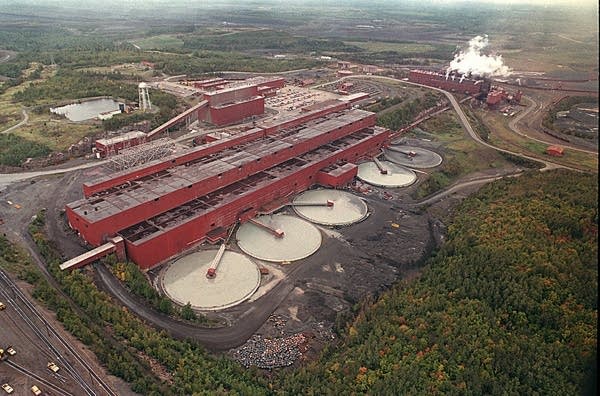What Glencore's ownership stake in PolyMet means for planned copper-nickel mine

Go Deeper.
Create an account or log in to save stories.
Like this?
Thanks for liking this story! We have added it to a list of your favorite stories.
Updated: 4:38 p.m. | Posted: 10:54 a.m.
The company planning Minnesota's first copper-nickel mine says its project is closer to becoming a reality, with help from one of the world's largest mining companies.
PolyMet Mining on Friday finalized the results of a stock offering that makes Swiss mining giant Glencore the majority owner.
Turn Up Your Support
MPR News helps you turn down the noise and build shared understanding. Turn up your support for this public resource and keep trusted journalism accessible to all.
Glencore is a major player globally in the production of copper, nickel, cobalt, zinc and lead, with mines in places like Australia, Bolivia, Kazakhstan and Canada.
And with the NorthMet mine project that's planned for near Babbitt and Hoyt Lakes, that list could soon include Minnesota.
"Glencore has been an important part of this project for more than a decade," said Bruce Richardson, a PolyMet spokesperson. He said Glencore has spent roughly $300 million in Minnesota to date. "We would not be where we are today without Glencore's support."
Before this week, Glencore had about a 30 percent stake in the company. It will now own about 72 percent of PolyMet after buying up shares through PolyMet's recent offering.

PolyMet has been slowly moving forward on its copper-nickel project in northern Minnesota for more than a decade. The project now has all the required permits in hand and has raised about $265 million through the stock offering, which will help the company pay off debt.
Paying off debt was an important step in getting banks to loan the company the roughly $1 billion needed to build the project, said Chris Berry, an independent analyst who advises mining companies. Neither PolyMet nor Glencore is among his clients.
"PolyMet will now turn around and go to the capital markets and say, 'Look, we have a deposit, we have the permits, we have a very large partner that obviously isn't going anywhere because they have a strong balance sheet,'" he said. "That's going to provide PolyMet some leverage in terms of their negotiating with banks to raise the capital."
Berry said the timeline for all of this is uncertain — factors like how well the copper and nickel markets are doing will play a big role in how quickly the financing moves forward. Prices are down right now, but when they improve, "the banks may be willing to open the purse strings a little bit more quickly," he said. "It just makes that project that much more economic and gives the banks a heightened level of certainty that they'll be able to get their capital back."
Berry said the long-term outlook for copper-nickel mining is positive. The demand for those metals will go up as electric vehicles become more common, he said.
In addition to the markets, there's one other major variable that will affect how quickly PolyMet can break ground: the courts. Opponents have filed legal challenges against several of the state and federal permits that PolyMet already has in hand.
"It's not a done deal," said Kathryn Hoffman, CEO of the Minnesota Center for Environmental Advocacy, one of the groups challenging the project. "PolyMet has a lot of hurdles and a lot of questions to answer before we should be letting them get at our natural resources here in the state."
Hoffman said environmental groups had already been concerned about risks to water quality and the loss of wetlands associated with the mine. The most recent legal snag for PolyMet came earlier this week, when the Minnesota Court of Appeals ordered a hearing on alleged irregularities in how state regulators dealt with federal regulators over a water pollution permit.
Now that Glencore is majority owner, Hoffman said, it has a lot of power. And for groups like hers, that's a cause for concern. In other parts of the world, Glencore has faced numerous environmental and human rights allegations at its mines. On Thursday, three dozen people were killed in a collapse at a Glencore-owned copper mine in the Democratic Republic of Congo, according to news reports. And Glencore has paid millions of dollars in environmental penalties worldwide.
"There's really no reason to think that Glencore will have any more respect for our natural resources and clean water than they have for natural resources in other places where abuses have occurred," she said.
But PolyMet's Richardson said the company has made promises to the state about protecting the environment and intends to keep them — regardless of Glencore's involvement in the project.
Graham Davis, a retired mineral economics professor at the Colorado School of Mines, said Minnesota is likely better off with a huge, global company like Glencore, which files corporate responsibility and sustainability reports, than a smaller one running the project. Davis, who bought PolyMet stock a few years ago and has been watching things play out, said the legal challenges could become a timing problem for PolyMet.
For example, if metals prices improve but banks want to wait for legal questions to be settled, the project could be delayed further. In contrast, "in a down market if there's legal delays it's not that costly because you may not want to develop a mine at that time anyway," he said.
Overall, though, Davis said he thinks it's only a matter of time before PolyMet's mine is operating.
"Legal challenges tend to delay projects, they don't tend to kill projects," he said.
PolyMet officials said they expect the Glencore stock purchase to be finalized Friday.


